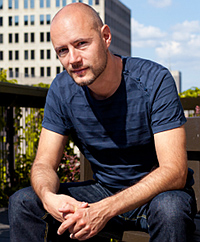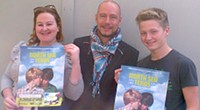 W O R L D D I R E C T O R S S E R I E S : 1 – B E L G I U M
W O R L D D I R E C T O R S S E R I E S : 1 – B E L G I U MPrincess, prince and king
Bavo Defurne takes us to North Sea Texas...


In London: Defurne with actors Eva Van der Glucht and Jelle Florizoone

On set: Defurne directs Florizoone
inNorth Sea Texas
BAVO DEFURNE
b 1971 • Gent, Belgium


PROTECTION (2009)
DRIVE ME CRAZY (2003)
CAMPFIRE (2000)
SAILOR (1998)
SAINT (1996)
PARTICULARLY NOW, IN SPRING (1995)
LUDODROME (1993)
TRAILER (1993)
ROHYPNOL (1992)
ATLANTIS (1990)

 Belgian filmmaker Bavo Defurne has gained respect around the world with his evocative short films, and has now turned his hand to his first feature, North Sea Texas, which continues his theme of youthful yearning for seemingly impossible love. Based on the Flemish novel This Is Never Over by André Sollie, the film is a sensitive story made rather bold and daring by the fact that the protagonist (and the actor playing him) is only 14. On a glorious spring afternoon, I raced from my morning screening of Titanic in 3D to meet Bavo by the river. We talked in the sunshine while children played all around us...
Belgian filmmaker Bavo Defurne has gained respect around the world with his evocative short films, and has now turned his hand to his first feature, North Sea Texas, which continues his theme of youthful yearning for seemingly impossible love. Based on the Flemish novel This Is Never Over by André Sollie, the film is a sensitive story made rather bold and daring by the fact that the protagonist (and the actor playing him) is only 14. On a glorious spring afternoon, I raced from my morning screening of Titanic in 3D to meet Bavo by the river. We talked in the sunshine while children played all around us...
North Sea Texas has been doing the festival circuit for several months. How have audiences reacted?
Most people really like it, but the audiences have been diverse, so have responded differently. In Montreal it was a world cinema festival, and here in London it's a gay festival: this was by far the warmest reaction. It was a bit overwhelming here really! Everybody was saying these very honest things about their own lives. Last night a man came to me and he said, "I have seen the youth that I never had." His first experience with another boy was when he was 25, and now he's seen this story about adolescence and it made him cry. This story makes people reflect and think about who they are, where they come from and what they have experienced.

I think people need to see something hopeful and positive.
Almost like Magnolia! Of course, Magnolia is different, but you have all these characters who have the same questions in life, an ideal dream of an unreachable love. It's nothing different — well you've just seen Titanic this morning! — it's a story about an impossible love and how you can make it more possible. And I think that's the thing about the film: we see people struggling to make it possible. And it's quite an optimistic film, not like Brokeback Mountain in which people are struggling against the impossible and in the end it's proven that it's impossible. But I live in a country, Belgium, where a man can marry a man. And I think as an artist I should remember that there are parts of society in which people can be who they are and live the love they have. So we shouldn't always be nagging about things that were wrong in the 1950s. Of course those stories are important and relevant, but I think people also need to see something hopeful and positive.
Was this the main theme that drew you to the novel?
Yes, definitely. My short film Campfire, set on a scouting trip where a boy falls in love with a boy and the only one who doesn't reject him is his ex-girlfriend, has been shown in the schools in Flanders. A lot of people ask me what happens next, and I didn't know. When you make a film, you're so happy that you've made it that you don't really reflect on what happens next. And I didn't know how to answer that question until I read this book: what happens next doesn't have to be suicide, death, an unhappy marriage, loneliness for the rest of your life. There are other answers and possibilities. I won't say they're easy. Unfortunately it really depends on where you're born, if your family is supportive, what's your school like, your community — it's not like we live in a utopia. But we should show that there are chances to be happy, at least in this imaginary world of cinema.
Was it tricky to finance a film in which the lead character is 14?
The producer and the financiers — there weren't a lot of financiers! — wanted me to make a film that's a next step to my shorts, so they were really behind me. During casting we saw boys from 14 to around 24, and it turned out that the only boy who was Pim, and who was really believable, was only 14. But he [actor Jelle Florizoone, who's now 16] is more mature than some 24-year-olds. His first test was incredible: he still knew the world of being 14, and his body was 14, but he knows much more. And I don't know where that comes from.
Well, he's also convincing at 18.
Yes, that's true. We had this trick with him, because we didn't shoot chronologically, and for new actors it's sometimes hard to get into the right mood. So for him we had this simple code: Pim goes from princess to prince to king. So if he would be doubting where he was in his arc, I would say you're in the "king" phase. And he would know that he was at his strongest now. The king pops up when he has the scenes with Gino [Mathias Vergels] at the end, he refuses to be the prince anymore and becomes a stronger man. And he was ready for it!

It’s the emotions,
not the stories.
I’ve had them all.
He didn't like that very much, but he's very professional. He was also well-supported by his family, and he had spent four years in ballet school. So the physicality was no problem for him, because he had been touching bodies all the time. He didn't like being naked, but said, "It's part of my job as an actor, so I need to do it now." Of course, we had security on the beach! It's interesting though that it's not an erotic scene, but for him it was the hardest thing to shoot, because he was totally alone. He had built confidence with the other actors for the kissing scenes; they felt safe in each others' arms, because we had this whole process of rehearsing. But Jelle and Mathias couldn't be more different: one is a punk rocker, and the other is a ballet dancer! When I look back at the first auditions with them together, I can see they are far away from each other, quite reserved but curious. And they were both ready to take the risk and trust someone they really didn't know and who was really different. And they are now very proud that they did it, that they did things they wouldn't have believed they would dare to do.
Did you identify with the story?
A little bit. My short films are more autobiographical, but this was more the story of the novelist, who's 60 years old now. But there are of course things things that I can connect to, even though my life was very different. It's the emotions, not the stories. I've had them all, and I think that any man, woman, gay or straight, all have these emotions of feeling alone and then finding first love.
What was Pim's alphabet game about?
That's something a lot of kids have. He doesn't have friends to play with, and it's almost like an abracadabra, a magic thing. So when Pim gets to the Zee [sea], it's the end of the prince, and after that he is king. So it's like hocus pocus, these words have a ritual meaning. He's trying to be who he wants to be, to be strong and self-confident, and he does that with these intimate games. He's leaving his childhood behind, leaving the selfish little things behind and saying, "Hey world, here I am! And I will confront you with who I am and who you are." And he really wants to prove that his love for Gino is true and strong and important. It's not a game; the game is over. And that's what the last part of the film is about: that strong king.
There's a note at the end thanking children whose parents wouldn't let them participate in the film.
Yes, there were many of them. At the beginning of auditions, the casting agent explained what the film was about, and a lot of kids didn't want to continue. Even during the last call-backs, one boy was crying, saying, "I can't kiss a man, not even for cinema." And I found that heartbreaking. I don't know if Jelle is gay, it's not any of my business. He simply played a role. But maybe some kids go to the cinema, and they see that there is a world out there when they will be grown-up and can be themselves and make their own choices in life. So I wanted to have that note for these kids. On the other hand, Mathias is older, and he's a rebel, so he'd say, "We have to make this film to show the Pope that he's not right!" It's nice to see these young kids who are so positive, whether they're gay or not. For them, it's about supporting a story about people's love that's important and beautiful.
SOUTHBANK, LONDON • 2.APR.12
HOME | REVIEWS | AWARDS | NEWS | FESTIVAL | Q&A | ABOUT | TALKBACK